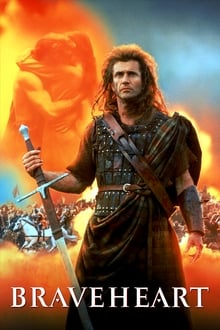
Historical flaws aside, Braveheart is a rousing spectacle.
So it comes to pass in the year of 1995 (not a year of our lord I think) that Mel Gibson would craft the award winning epic that is Braveheart, a film that is historically bent in the extreme, that is directed by a man who would go on to have a less than favourable character reputation, and a film that has a heavy handed approach at times. It's also as choppy as a boat ride during a tidal wave, so yes, Braveheart is far from flawless folks. Yet the structure, the epic emotional swirls and sheer spectacle of it all marks it out as a rousing treat.
It's a lavish gargantuan epic that somehow seems out of place for the year it was made, perhaps the secret of the films' success is because the 90s were crying out for an epic to get us hankering back to those halcyon days of Spartacus et al. Or just maybe the film punched the buttons of the public psyche because it is a great and grand thing to see the little people rise up and kick some ass? The oppressed and the bullied strike back as it were, surely that theme works for the normal human being? It's a sweeping tale that involves love, loyalty, honour, dishonour, treachery, death & heroes and villains. In short it ticks all the boxes for the genre it sits in (clinical bloody battles superbly full on). Gibson is William Wallace, and although he may struggle to nail the Scottish accent to fully convince at times, he more than makes up for it with his verve and vigour when delivering his lines - with the Sons Of Scotland speech at Stirling a particular iconic highlight.
Patrick McGoohan is pure egotistical villainy as Longshanks, King Edward I, and the supporting cast also do sterling work (or should that be Stirling?). Brendan Gleeson, Tommy Flanagan, Catherine McCormack, Angus Macfadyen, and the wonderful James Cosmo all add flavour to the delightful scotch broth on the screen. The score by James Horner is appropriately tight to the themes at work in the piece, and the cinematography by John Toll was rightly awarded at Oscar time since he captured the essence of the film. Be it the lush rolling hills or the blood stained field in the aftermath of battle, Toll's work is critically in sync with the unfolding mood of the picture.
So yes, damn straight, flaws and all, pic has the ability to lift and inspire many a discerning viewer. It does kick you at times, but as it does so, it also emotionally engages you from start to finish - to which the film deserves every accolade and award that it won. Because the grandiose epic had seemed long gone, but Gibson and his army brought it back to the modern era and made a genre piece fit to hold it's head up high with the greats of years gone by. 10/10